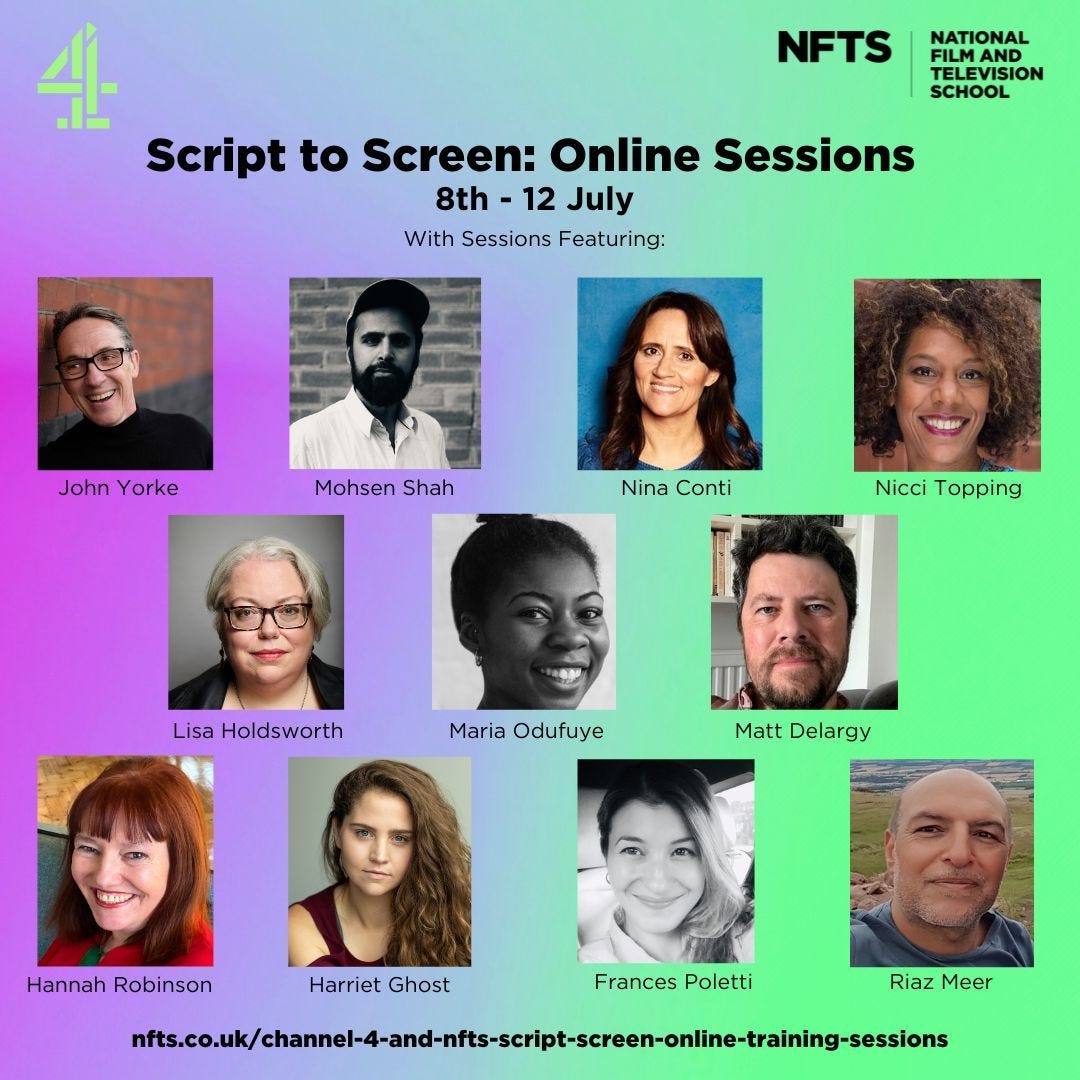A couple of weeks ago I had the pleasure of sitting in on a week’s-worth of webinars, organised by Channel Four and the National Film and Television school.
The talks covered various topics, from casting actors, film editing, working with a script editor, and the multiple routes to having your writing produced.
Each of the talks was aimed at different skill levels, so the talk I found most useful was How to manage your first commission with screenwriter Frances Poletti. It was full of useful, practical advice like figuring out what subjects you’re most passionate about and how to use genre as a Trojan horse (Frances spoke about how managed to include social realism into her recent ITV series Without Sin.) Frances also talked about completion rates on streaming services such as ITVX and Netflix, and what is considered to be an example of a successful television series i.e. First episodes could have a 70% finish rate, but only 20% watched the entire series. (Without Sin had a 70% overall completion rate, which is good news for everyone involved!)
Some other words of advice were:
“What is my style of writing?” - Whatever is in my DNA. Whatever I’m passionate about, so that would be people, characters, relationships, comedy.
What was the last drama you loved? Get in touch with the production company.
Write different treatments on different genres.
Sell what you’re about; you need to be able to communicate well, and be a brand for people.
Write down 5 things you want the person you’re pitching to to know about you: Where you’re from, what you love, things you care about, series that you’ve watched and loved. What are your strengths e.g. I love writing dialogue.
Write with a dream cast in mind.
Humanize the characters and then take them “into the office” i.e. If you’re writing a police drama, don’t make it all about the mystery.
Pose questions in scenes to guide the audience through the story.
Every act is a three-act structure: Think where the ad breaks are (every 12 mins or so) and make sure each act/chunk of the story has structure.
One of Frances’ favourite playwrights is Simon Stephen, who advocates the following exercise for getting the creative juices flowing:
“Start every line with ‘I remember…’ then free write. This forces you to jump back into your hard drive of memories to see what emotions, themes and transitional moments in your life return on the page.
When you finish writing a memory, start a new line with ‘I remember…’ and keep going again until the time is up. The idea of freewriting is that you aren’t allowed to go back and edit, you just have to keep writing. It’s so liberating.”
Go to the locations of what you’re writing about (if you’re writing about a place you know well/ based on memory).
If it’s a chatty scene make sure it has got integral plot in it.
Include a few rug-pulls in every episode: let the audience think they know where it’s going, but then they don’t. The audience needs to be off-balance, so throw them off when they think they’ve got it pegged.
Create one page treatments of your projects to show agents you’ve got legs. The treatment should include Story and Character breakdowns, and close with a a short paragraph on “Why do I want to write this show”.
As a writer you must fight your corner - but pick your battles with script changes.
The other talk which I found useful was Finding Stories and Adapting for the Screen with writer/producer Matt Delargy. (Matt was a producer on Nowhere Boy and Black Death.)
What struck me most about Matt’s talk was the amount of focus he put on self-care for the writer, which I don’t think I’ve heard from any other webinar/festival talk - there may have been a one-line “Be kind to yourself” but not anything as deliberate as Matt’s talk. Most talks are all about generating work and getting stuff done, but what happens when you burn out? Writing is solitary. Rejection is everywhere. There’s pressure to earn money to stay afloat. Even other people’s opinions and expectations can weigh on you. What other profession has so many people speaking into their careers and lives?
You need to take care of yourself. We are the product. Our brains. Skills. Creativity. That’s what we’re selling. It’s exposing. It can make you vulnerable. There are abundant days of rejection. Always keep doing. You can’t keep putting the bucket down the well or one day you will hear the clunk.
Don’t tolerate poor behaviour. Have boundaries.
Reputation is important. Are you a good person to work with? Are you kind? Do you apologise for mistakes? Can you disagree agreeably?
Take yourself seriously. Take professional development seriously.
Conflict is the heart of all drama.
Find and write stories that resonate.
Look at Cultural IP: historical stories, crimes - universal stories which are floating about in the world. It’s free. You can own it. Find free stories that are in the ether.
Use other shows as reference points to explain your project: “It’s not like those but it’s in that space (i.e. Chernobyl, Handmaid’s Tale)”.
SIMPLIFY. DEEPEN. SURPRISE. - all development ideas come down to that.
I hope you find these notes useful - I did!



